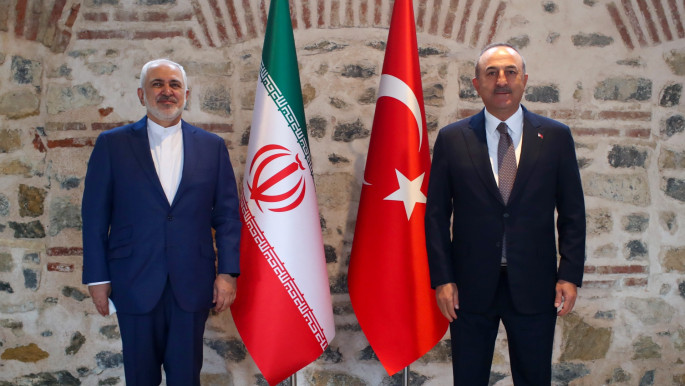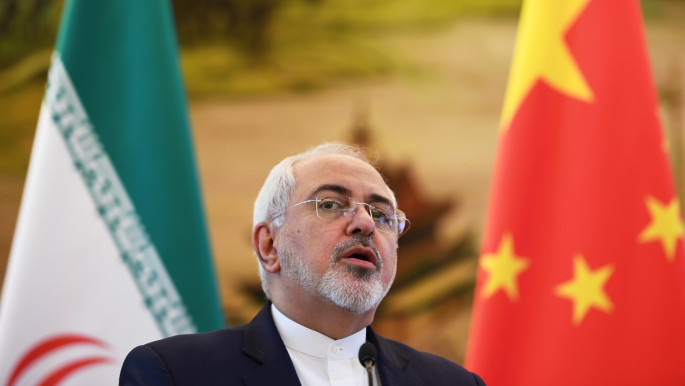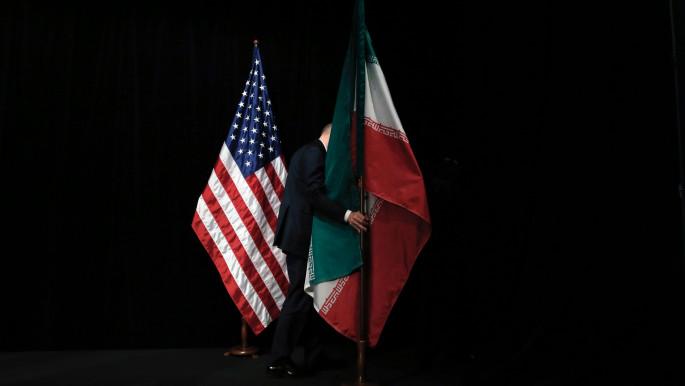How America's 'maximum pressure' on Iran made China a winner
In exchange, Beijing has committed to investing roughly $400 billion in various sectors of Iran's economy such as healthcare, banking, railways, information technology, ports, and telecommunications.
Iran's Tasnim News Agency hailed this cooperation agreement as a triumph against "Westernists" and a major achievement for Tehran's "Look East" foreign policy agenda. Shortly after signing the deal, Iran's Foreign Minister Mohammad Javad Zarif referred to China as a "friend for hard times" and spoke of centuries of Sino-Iranian cooperation. Tehran's top diplomat asserted that the pact will "further strengthen the ties of the two nations."
Iranian President Hassan Rouhani thanked China's Foreign Minister Wang Yi for Beijing's support for the Joint Comprehensive Plan of Action (JCPOA) and willingness to stand against "American unilateralism". Rouhani also declared that Tehran and Beijing can collaborate in the struggle against "terrorism and extremism in the region".
Maintaining a realistic assessment
In terms of diplomacy and geopolitics, this deal is a huge win for Iran. Tehran has seemingly managed to gain some breathing room as President Joe Biden's administration has not rushed the US back into the JCPOA and Washington's crippling sanctions continue strangling Iran's economy. Over time, it will be interesting to see the extent to which sanctions-battered Iran will benefit economically from this 25-year pact with China. For now, however, observers should view the China-Iran deal somewhat sceptically.
 |
Some experts suggest that the China-Iran pact might be about symbolism rather than anything of substance |  |
Esfandyar Batmanghelidj, a London-based economic development analyst who focuses on Iran and Central Asia, maintains that the $400 billion figure comes from unreliable sources and seems "completely made up". In September 2020, Jacopo Scita, an Al-Sabah doctoral fellow at Durham University's School of Government and International Affairs, wrote a piece titled "No, China Isn't Giving Iran $400 Billion" in which he explained how it is unclear whether an investment of this size is even plausible.
"As long as US sanctions are in place against Iran, I don't see any real prospect for extensive cooperation between the sides, let alone joining forces against those sanctions," Dr. Hamidreza Azizi, an Alexander von Humboldt fellow at the German Institute for International and Security Affairs in Berlin, told The New Arab.
 |
|
| Read more: Why Turkey wants Biden to salvage the Iran nuclear deal |
"China has not shown any real interest in ignoring US sanctions in practice. Soon after the US withdrawal from the JCPOA and the reimposition of sanctions, China stopped its cooperation with Iran in some important infrastructural fields, like energy. Meanwhile, Chinese banks have imposed severe restrictions even for Iranian citizens residing in China. Those regulations – justified by the US sanctions – are sometimes much stricter that those of the Western banks."
Some experts suggest that the China-Iran pact might be about symbolism rather than anything of substance. It is important to recognise that this deal between Beijing and Tehran is, for now, "a roadmap for long-term cooperation and does not entail any executive or operational details," explained Dr Azizi.
"For any meaningful cooperation to happen, including on the sanctions issue, there's a need for separate follow-up agreements to be signed. So, technically speaking, it's still too soon to speak of any insurance as such against the US sanctions – though the two sides seem to have the political will."
Looking ahead, one important issue to analyse is how much this agreement does to move Iran closer to upgrading its status within the Shanghai Cooperation Organisation (SCO) from observer to permanent member. Seeing the SCO as a "club of revisionist states" that stands against Washington and in favour of greater multipolarity in the international order, Tehran believes that full membership in the bloc would boost Iran's abilities to counter Washington's policies against Tehran by bringing the Islamic Republic even closer to China and Russia, which both play leadership roles inside the SCO.
 |
Iran has sent the Biden administration its own message that if Washington doesn't return to the JCPOA and lift sanctions, Tehran can further integrate with China to minimise the impact of US pressure |  |
Domestic concerns
Not all Iranians are celebrating this cooperation agreement. In fact, some have huge concerns about the Iranian government having ceded sovereignty to Beijing as a price to pay for Chinese insurance against US sanctions. The deal will lead to the "selling of Iran to China" according to many Iranians who have blasted the 25-year bilateral agreement and slammed it as a "colonial" pact while worrying about China plundering their country's natural resources.
However, Dr Azizi does not see the deal necessarily coming at the expense of Iran's national sovereignty. "I think the issue of 'relinquishing sovereignty' is totally irrelevant here, as the roadmap does not entail any specific commitment. Iranian public opinion is very sensitive toward working with China and Russia - for historical and political reasons - but in reality, I don't see any sovereign rights having been surrendered to China as a result of the recent agreement."
 |
|
| Read more: China and Iran's strategic partnership: A zero sum game? |
China's vested interests in the JCPOA's revival
As one of the JCPOA's signatories, Beijing has its own vested interests in the nuclear accord being revived. China does not want to see nuclear weapons proliferate in the Middle East. Beijing also does not want the pretext of a 'nuclear threat' being used to justify US and/or Israeli military action against Iran that could lead to a new war in the Gulf - a scenario that would have extremely harmful economic impacts on China. Along with the Russians and Europeans, China's leadership believes that the JCPOA is the most realistic way to prevent such a catastrophic situation from unfolding.
Beijing strongly condemned the US for withdrawing from the accord in May 2018 and China maintains its firm position that Washington must immediately lift its sanctions on Iran, as stressed by China's Foreign Minister Wang Yi on his two-day visit to Tehran last month. China, along with Russia and Iran, is supporting efforts by the European Union to foster constructive dialogue about Washington's possible return to the accord and ways "to ensure the full and effective implementation of the agreement by all sides."
 |
Although it is unclear how much Beijing could or would do for the Islamic Republic, China is undeniably the winner of the US' failed 'maximum pressure' campaign |  |
Speaking in Tehran, Beijing's chief diplomat emphasised China's determination to support Iran as the current administration in Washington seems to have spent the past nearly three months leveraging the pressure that Trump built up on Tehran, rather than abandoning "maximum pressure" in favour of "maximum diplomacy". In Wang's words, "China firmly supports Iran in safeguarding its state sovereignty and national dignity."
This assertive stance from China needs to be seen within the context of escalating tensions between Washington and Beijing over numerous issues such as Covid-19, Xinjiang, Tibet, Hong Kong, Huawei, and Beijing's actions in the South China Sea. There is no question that China is now making Iran another issue in the overall Beijing-Washington rivalry.
 |
|
| Read more: Could Biden bring the US back into the Iran nuclear deal? |
It seems that by signing this agreement with Tehran, China is putting more pressure on the US to step back into the JCPOA. Meanwhile, Iran has sent the Biden administration its own message that if Washington doesn't return to the JCPOA and lift sanctions on Tehran, the Iranians can further integrate with China to minimise the impact of Washington's pressure rather than succumb to it.
'Maximum pressure' makes China the winner
Although it is unclear how much Beijing could or would do for the Islamic Republic, China is undeniably the winner of the US' failed "maximum pressure" campaign. As this 25-year cooperation agreement pushes Iran further into China's geo-economic orbit, it is worth asking where this leaves Washington.
Ultimately, it would be difficult to persuasively argue that stronger Sino-Iranian relations - an unintended consequence of America's foreign policy - advance US interests. In reality, "maximum pressure" has been a gift to Beijing, helping China gain greater influence in the Middle East, where American influence continues to decline.
Looking ahead, it will be important to observe what lessons other countries targeted by US sanctions take away from the China-Iran pact as those governments try to circumvent Washington's pressure tactics in the smartest ways possible.
Giorgio Cafiero is the CEO of Gulf State Analytics, a Washington, DC-based geopolitical risk consultancy.
Follow him on Twitter: @GiorgioCafiero




 Follow the Middle East's top stories in English at The New Arab on Google News
Follow the Middle East's top stories in English at The New Arab on Google News


